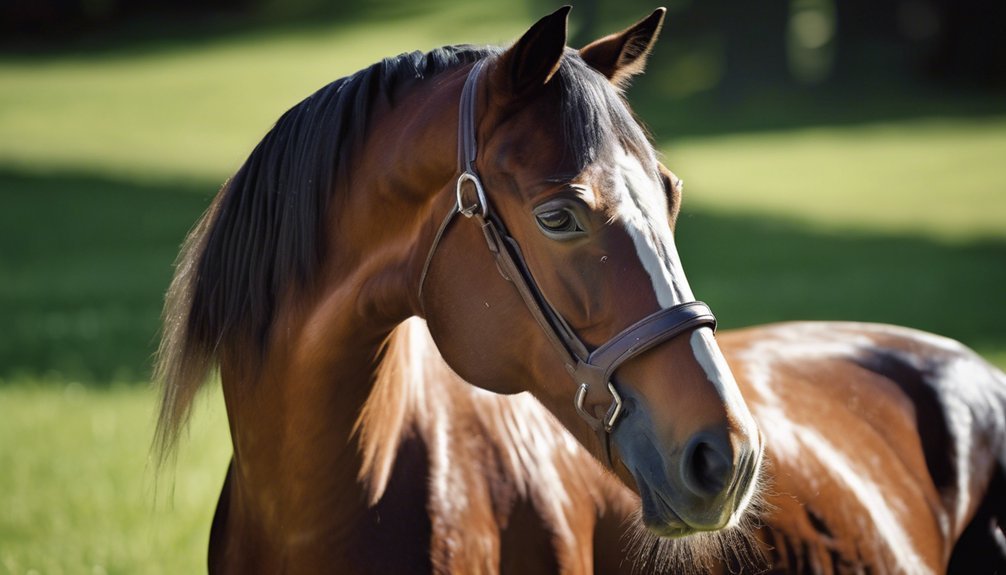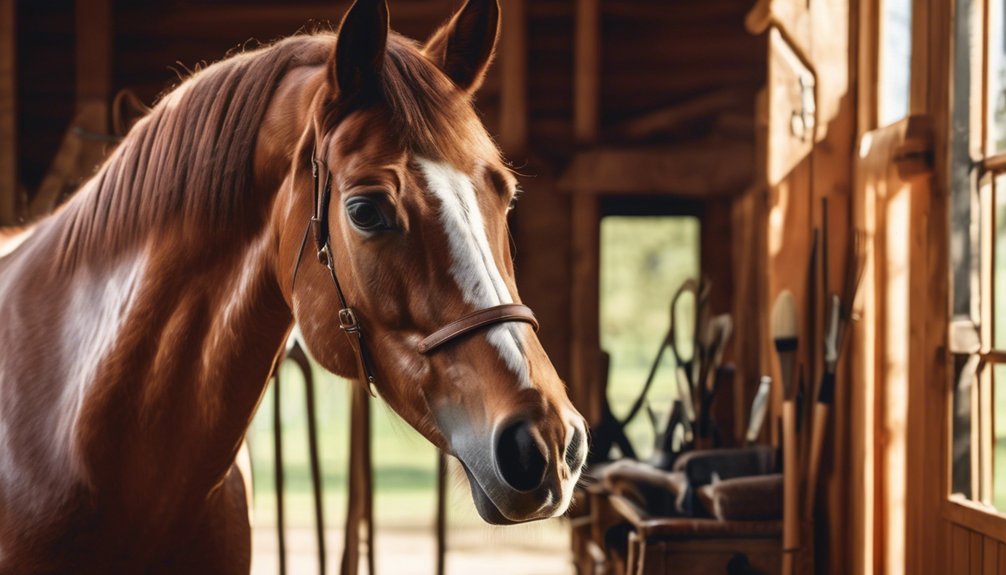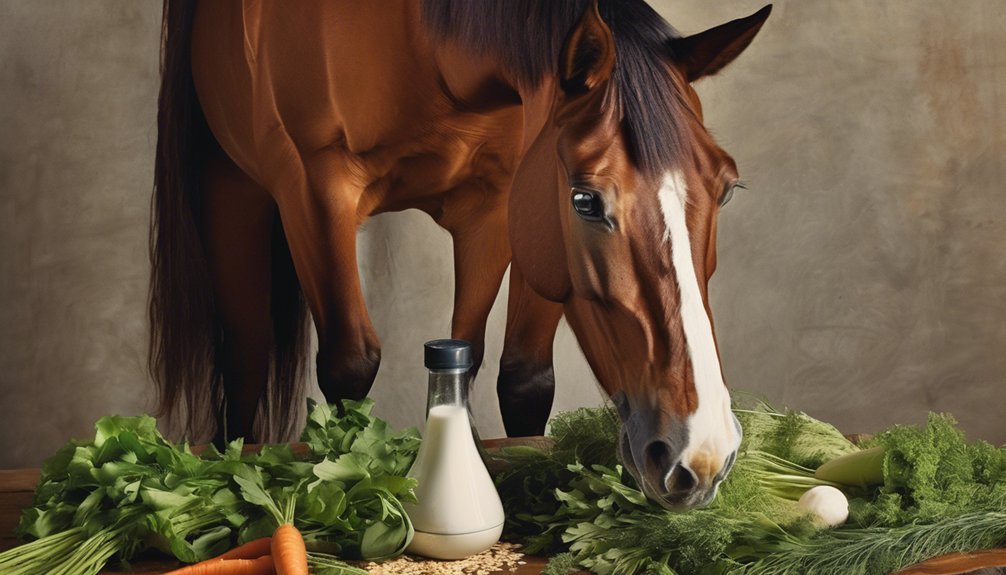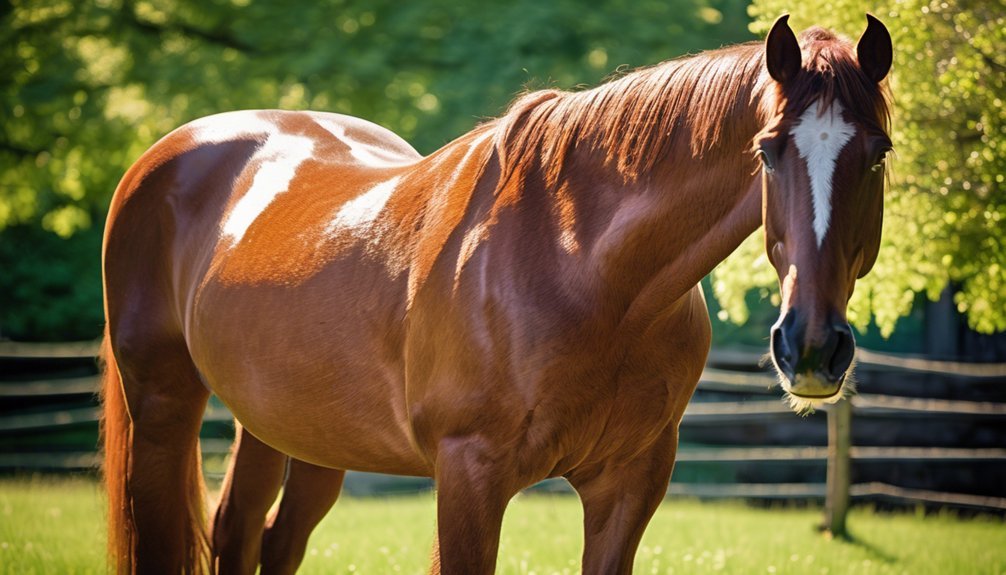
If you've noticed flakiness in your horse's coat, it's essential to address the issue promptly. Flaky coats can signal underlying health problems or environmental stressors. Regular grooming is crucial, but you also need to consider nutritional factors and potential allergies. Understanding these elements is key to restoring your horse's coat to its optimal condition. Let's explore the various causes and effective solutions to achieve a healthy, vibrant coat.
Key Takeaways
- Identify and address potential allergies or sensitivities by evaluating the horse's environment and feed ingredients.
- Maintain a regular grooming routine, incorporating currying and brushing to enhance coat health and reduce flakiness.
- Choose appropriate grooming tools, such as high-quality brushes and conditioners, tailored to your horse's coat type.
- Ensure a balanced diet rich in vitamins A, E, biotin, and essential minerals like zinc and copper for optimal coat health.
- Consult a veterinarian if flakiness persists or if there are signs of irritation or behavioral changes in your horse.
Understanding the Causes of Flaky Coats

Flaky coats in horses can stem from various underlying issues, and understanding these causes is crucial for effective management.
One common cause is allergies and sensitivities, which can result from environmental factors like dust, mold, or certain feed ingredients. These allergens trigger an inflammatory response, leading to flakiness.
Additionally, skin infections, whether bacterial or fungal, can also contribute to coat health issues. Infections often cause irritation and disrupt the normal shedding process, exacerbating flakiness.
It's essential to observe your horse's skin closely for signs of redness or irritation, as early detection can significantly improve treatment outcomes.
The Importance of Regular Grooming
Regular grooming plays a vital role in maintaining your horse's coat health and can significantly mitigate the effects of flakiness. By establishing an appropriate grooming frequency, you ensure that dead skin cells, dirt, and excess oils are regularly removed, promoting a healthier coat.
Aim for daily grooming sessions, adjusting based on your horse's activity level and environment.
Utilizing effective grooming techniques—like currying to stimulate the skin and brushing to distribute natural oils—can enhance circulation and support a shiny, resilient coat.
Pay attention to specific areas prone to flakiness, ensuring they receive adequate care.
This consistent routine not only fosters a deeper bond between you and your horse but also keeps their coat vibrant and healthy, reducing the likelihood of flakiness.
Choosing the Right Grooming Tools

When selecting grooming tools for your horse, it's essential to consider both their effectiveness and your horse's specific coat type. Investing in high-quality grooming brushes, such as curry combs and soft-bristled brushes, can significantly impact the health of your horse's coat. They help remove dirt and debris while stimulating the skin, promoting circulation.
Additionally, don't underestimate the importance of coat conditioners. These products can nourish your horse's coat, reducing flakiness and enhancing shine. Choose a conditioner that suits your horse's coat type—whether it's thick, fine, or curly.
Bathing Your Horse: Best Practices
Bathing your horse is crucial for maintaining a healthy coat and skin, especially if you notice signs of flakiness.
Proper hair care involves more than just occasional washing; it requires a consistent bathing frequency tailored to your horse's needs. Here are some best practices to consider:
- Choose the Right Shampoo: Use a gentle, pH-balanced shampoo formulated for horses to avoid skin irritation.
- Temperature Matters: Ensure the water is lukewarm to promote comfort and relaxation during the bath.
- Rinse Thoroughly: After shampooing, rinse your horse completely to prevent residue buildup, which can contribute to flakiness.
Nutritional Factors Affecting Coat Health

Maintaining a horse's coat isn't solely about external care; nutritional factors play a vital role in overall coat health. Ensuring your horse receives a balanced diet rich in essential nutrients is crucial.
Vitamin deficiencies, particularly in vitamins A, E, and biotin, can lead to a dull, flaky coat. Additionally, the right mineral balance, including zinc and copper, supports healthy hair growth and skin condition.
You might consider integrating high-quality forage and concentrates that meet your horse's specific needs. Regularly evaluate their diet and consult with a veterinarian or equine nutritionist to address any potential deficiencies.
Supplements for a Healthier Coat
Supplements can play a crucial role in enhancing your horse's coat health and overall appearance. Incorporating specific supplements can address flakiness and improve shine.
Consider the following:
- Fatty Acids: Omega-3 and Omega-6 fatty acids are essential for maintaining a healthy coat. They promote hydration and reduce dryness.
- Vitamins: Vitamins A, E, and biotin support skin health and encourage hair growth, contributing to a lustrous coat.
- Herbal Remedies: Natural supplements like flaxseed and nettle can improve coat texture and reduce flakiness.
Environmental Factors Contributing to Flakiness

While many horse owners focus on diet and grooming to enhance coat health, environmental factors can significantly contribute to flakiness as well.
Climate changes, including extreme temperatures and humidity fluctuations, can stress your horse's skin, leading to dryness and irritation. Low moisture levels in the environment can exacerbate these issues, causing the skin to lose its natural hydration.
Additionally, if your horse spends extended periods in dusty or dirty environments, this can result in a buildup of irritants that compromise coat health.
Be mindful of these factors, as they can intensify flakiness and affect your horse's overall comfort. Creating a suitable environment, with balanced humidity and clean surroundings, plays a vital role in maintaining a healthy, vibrant coat.
When to Consult a Veterinarian
How can you tell when it's time to consult a veterinarian about your horse's flaky coat? Prompt action is crucial for ensuring your horse's health.
Here are three key indicators for symptom evaluation:
- Persistent Flakiness: If the flaky coat doesn't improve after adjusting environmental factors or grooming routines.
- Skin Irritation: Look for signs of redness, swelling, or lesions that may indicate an underlying condition.
- Behavior Changes: If your horse shows signs of discomfort, like excessive itching or changes in appetite, it's time to seek professional advice.
Your veterinarian can offer tailored treatment options to address the root cause of the flakiness, ensuring your horse remains healthy and comfortable.
Don't hesitate to reach out when you notice these signs.
Frequently Asked Questions
Can Weather Changes Affect My Horse's Coat Health?
Yes, weather changes affect your horse's coat health. Seasonal changes and varying humidity levels can lead to dryness or excess oil, impacting coat condition. Regular grooming and proper nutrition help maintain a healthy, vibrant coat.
Is Flakiness Common in Certain Horse Breeds?
You've noticed some breeds, like Arabians, often have sleek coats, while others, such as Thoroughbreds, might display flakiness. Isn't it fascinating how genetics and environment play significant roles in each horse's unique coat condition?
How Often Should I Check for Coat Flakiness?
You should check for coat flakiness during daily grooming, especially during seasonal changes. Regular inspections help you identify issues early, ensuring your horse's coat remains healthy and vibrant, fostering a close bond between you both.
Are There Natural Remedies for Flaky Coats?
Absolutely! Herbal treatments like flaxseed and dietary supplements such as omega-3 fatty acids can significantly support skin health. You'll notice a smoother, shinier coat, making your horse feel fabulous and look fantastic.
Can Stress Contribute to a Horse's Flaky Coat?
Yes, stress triggers can significantly impact your horse's coat condition. Employing effective grooming techniques not only alleviates stress but also promotes healthier skin and coat, helping you maintain your horse's overall well-being.
Conclusion
By addressing flakiness in your horse's coat through regular grooming, proper nutrition, and environmental considerations, you can help restore its luster and health. Remember, a horse's coat isn't just a layer of fur; it's a reflection of overall well-being. If you've tried these methods and the problem persists, don't hesitate to seek veterinary advice. After all, a healthy coat is a testament to the care and attention you provide, ensuring your horse shines inside and out.





